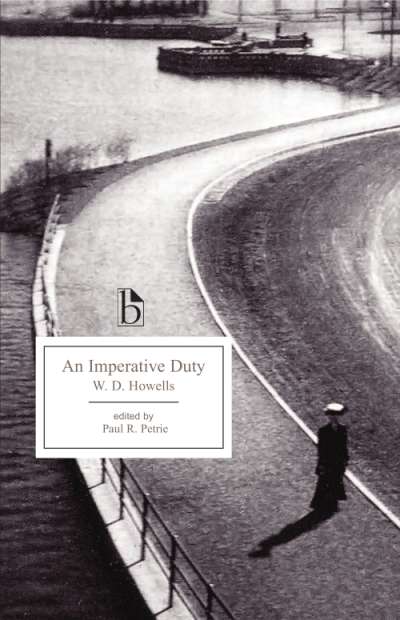
“Is it the intention of law-makers that good men shall be hung ever?” asked Henry David Thoreau. The question has never been academic, but in 1924, when Herman Melville’s Billy Budd, Sailor was published posthumously, we understood better than ever why. An uneasy if beautiful account of the human cost of realpolitik, Billy Budd, Sailor asks how far we should go to protect the status quo. When does the reaction to a security crisis become reactionary? In the novella John Claggart, master-at-arms of a British warship, alleges a sailor is talking mutiny. The sailor, Billy, isn’t just innocent of the charge; he’s a true innocent. Yet when confronted by his accuser, Billy reacts impulsively, striking Claggart. The resulting trial shows the horrors that can follow from a civilized society following its own laws.
This Broadview Edition is based on the authoritative Hayford-Sealts copy-text of Billy Budd. The introduction distills the long and complex critical conversation about the work since its publication, and the historical appendices feature materials on mutiny, capital and corporal punishment, philosophical pessimism, sexuality, and the rule of law.
Comments
“This is the most teachable edition of Billy Budd available. It lucidly situates Melville’s novella within its legal, literary, and historical contexts, providing a variety of compelling ways to approach the text. Michael J. Everton’s introduction is also incisive and engaging. This edition is an impressive achievement.” —Cody Marrs, University of Georgia
“Michael J. Everton and Broadview Press have produced an excellent new edition of an important book. Everton’s beautiful introduction and thoughtful notes provide the reader with a rich sense of the historical contexts and literary references essential to Melville’s seminal meditation on justice and law. This edition also helpfully includes a comprehensive bibliography.” —Gregg Crane, University of Michigan
“This gallant, many-flagged schooner of an edition is a superb resource for teaching Melville’s novella. Everton’s sprightly introduction (e.g., Billy is a ‘right-hook artist time-travelled from classical Greece’) should rally students who might otherwise wilt in the face of Melville’s late prose and the arcane world of Nelson’s navy.” — Dawn Coleman, Leviathan
Acknowledgements
Introduction
Herman Melville: A Brief Chronology
A Note on the Text
Billy Budd, Sailor (An Inside Narrative)
Appendix A: The British Debate over the French Revolution
- From Edmund Burke, Reflections on the Revolution in France (1790)
- From Thomas Paine, Rights of Man (1791–92)
Appendix B: The Rule of Law
- From Herman Melville, White-Jacket (1850)
- From Ralph Waldo Emerson, “The Fugitive Slave Law” (1851)
- From Henry David Thoreau, “Slavery in Massachusetts” (1854)
- From Henry David Thoreau, “A Plea for Captain John Brown” (1859)
- Herman Melville, “The Portent (1859)” (1866)
- Herman Melville, “The House-top. A Night Piece (July, 1863)” (1866)
- Sarah Piatt, “The Palace Burner. A Picture in a Newspaper,” The Independent(28 November 1872)
- From L. H. Atwater, “The Great Railroad Strike,” Presbyterian Quarterly and Princeton Review(October 1877)
- From Clement, “Let Law Violated Be Vindicated,” New York Evangelist (26 August 1886)
- From Arthur Edwards, “Chicago’s Experience with Anarchy,” Chautauquan(December 1886)
Appendix C: Naval Mutiny
- The Spithead and More Mutinies, 1797
a. From Robert Southey, The Life of Nelson (1813)
b. From Souglas Jerrold, Black-Eyed Susan(1829)
c. From Captain [Frederick]Marryat, The King’s Own and the Pirate (1830)
- The Somers Mutiny, 1842
a. From [Charles Sumner,] “The Mutiny of the Somers,” North American Review (July 1843)
b. From Gail Hamilton, “The Murder of Philip Spencer,” Cosmopolitan (June-August 1889)
Appendix D: Corporal Punishment
- From Captain [Frederick] Marryat, The King’s Own and the Pirate (1830)
- From Richard Henry Dana, Jr., Two Years before the Mast (1840)
- From Herman Melville, White-Jacket (1850)
- From Solomon Northup, Twelve Years a Slave (1853)
- From [Harriet Ann Jacobs,] Incidents in the Life of a Slave Girl (1861)
- From Herman Melville, “Bridegroom Dick. 1876” (1888)
Appendix E: Capital Punishment
- From Statutes Relating to the Admiralty, Navy, Shipping, and Navigation of the United Kingdom (1749)
- From Herman Melville, Typee (1846)
- From Herman Melville, White-Jacket (1850)
- From Arthur Schopenhauer, “On Suicide” (1851)
- From E.S. Nadal, “The Rationale of the Opposition to Capital Punishment,” North American Review (January 1873)
- From Elbridge T. Gerry, “Capital Punishment by Electricity,” The Arena (January 1889)
- From Hugh O. Pentecost, “The Crime of Capital Punishment” (1890)
- From Frederick Douglass, “Lynch Law in the South,” North American Review (July 1892)
Appendix F: Sexuality
- From Statutes Relating to the Admiralty, Navy, Shipping, and Navigation of the United Kingdom (1749)
- Walt Whitman, “In Paths Untrodden” (1860)
- From John Addington Symonds, A Problem in Greek Ethics (1883)
- From Herman Melville, “Bridegroom Dick. 1876” (1888)
- From John Addington Symonds, Walt Whitman: A Study (1893)
- W.H. Auden, “Herman Melville” (1939)
Appendix G: Pessimism
- From Arthur Schopenhauer, The World as Will and Idea (1819–44)
- From James Thomson, The City of Dreadful Night (1870–74)
- Herman Melville, “The Berg. A Dream” (1888)
- Herman Melville, “The Enthusiast” (1891)
- From William James, The Varieties of Religious Experience (1902)
Works Cited and Select Bibliography
Michael J. Everton is Associate Professor of English at Simon Fraser University and the author of The Grand Chorus of Complaint: Authors and the Business Ethics of American Publishing (Oxford University Press, 2011).














